Tuesday's Fed action
The FOMC announced a 50 basis point rate cut at the end of their meeting on Tuesday, bringing the federal funds rate target down to 2.5 percent and the discount rate to 2 percent. In the past year, the Fed has reduced the federal funds rate target by 400 basis points to its lowest level since February 1962. Along with the rate cut, the Fed issued a statement saying that the September 11 terrorist attacks "significantly heightened uncertainty in an economy that was already weak." The larger degree of uncertainly is expected to dampen further business and household spending. Fed policy makers maintained their bias toward easing.
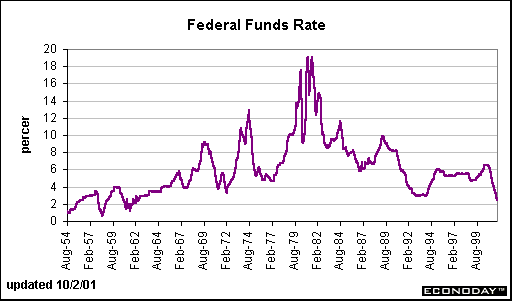
It is the Fed's job to provide liquidity in times of crisis. The Fed also has a role as an economic savior. Trying to spur economic activity and confidence levels, the Fed cut rates by 300 basis points through August. The 100 basis points of cuts of the past three weeks were aimed at easing business and consumer jitters following the terrorist attacks. Many economists are now declaring that a recession is imminent or is already in place. While the Fed acted appropriately in trying to calm financial markets and American consumers with two rate cuts, it is also true that Alan Greenspan has stated that the government should move cautiously in providing aggressive fiscal stimulus. In his cautious remarks to Congress, Greenspan indicated that he felt the long term viability of our economy was not in doubt and that it would be prudent to see what happens in the next couple of months before aggressively cutting taxes or increasing government spending.
This suggests that Greenspan is not entirely convinced that a deep recession is a done deal. Nor are we. No doubt that economic data will look dicey for the months of September and probably October, but there stands a good chance that activity will be bustling more noticeably by year-end. Consider that the Fed's aggressive moves of the past year have yet to be felt. Tax rebates coupled with a reduction in tax-withholding schedules that began in July will play a role in consumer spending in the coming months. Furthermore, consumers will also benefit from lower oil prices. In addition, home refinancing is at all time highs. While some consumers will take the opportunity to bundle up their installment debt with the refinancing, mortgage rates in any case have come down enough that overall monthly payments are likely to decrease for many households.
Fed Funds Rate and Treasury Yields
In the beginning of the year the Treasury market had anticipated Fed policy, so that early rate cuts were not accompanied by similar declines in Treasury yields. After the first quarter, the 2-year Treasury note yield showed some signs of declining, but the yield on the 10-year Treasury note actually increased on the prospect that inflationary pressures would percolate with the aggressive Fed easing. As inflation fears eased, yields began to come down in unison across the spectrum of maturities. The terrorist attacks on September 11 caused yields to tumble as investors fled to the safe-haven of Treasury securities. After the stock market re-opened for trading, yields fluctuated in a wide range as investors tried to weigh the evidence. Safe haven status puts downward pressure on Treasury yields, as does the prospect of an imminent recession. Putting upward pressure on rates were budget worries, concern that the U.S. Treasury, to meet government spending needs, would increase borrowing at a time of economic weakness and low tax receipts. In the past week, yields generally declined on the bearish outlook for the economy.
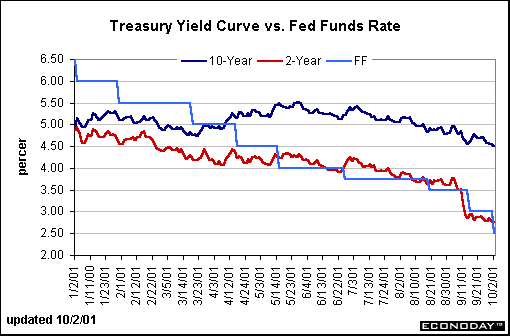
Economic impact
Consumers can't borrow money at the federal funds rate. If they could, there would be no question that it is cheaper to borrow today than it was six months ago. But consumer loans are tied to various market rates. To some extent they are tied to the federal funds rate in as much as this rate is tied to the prime rate. Large money center banks immediately lowered their primate rate to 5.5 percent after Tuesday's rate cut. Home equity loans are tied to the prime, so consumers will benefit. However, most credit card loan rates don't usually feel the impact of Fed rate actions.
One would expect mortgage rates to move in tandem with the federal funds rate, but mortgage rates are tied to Treasury yields. Mortgage rates have come down with yields on the 10-year Treasury note, albeit not by the same magnitude. Since May 2001, the spread between the 10-year Treasury and the 30-year mortgage rate climbed 31 basis points. Notice that this spread is not at an all-time high; a break occurred in this series in late 1998-99 when the spread between 10-year yields and 30-year mortgage rates increased by as much as 60 to 80 basis points. The break followed the Treasury's announcement to reduce supply due to reduced government borrowing, causing yields on Treasury securities to fall back sharply.
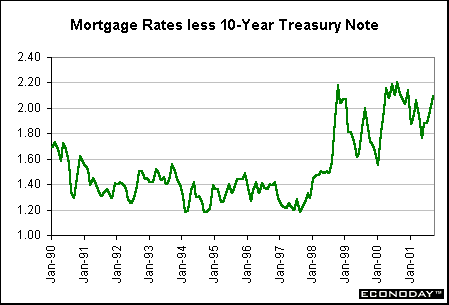
In any case, the housing sector has remained strong this past year, only recently showing signs of moderation. It is a good bet that more investors will turn to real estate as "cash becomes trash" (no interest earnings when rates are so low) and the stock market takes a while to get going. If yields on Treasuries continue to dip, mortgage rates could come down some more, although they are already near their lows set in the 1990s. This could keep the housing sector lively in the next few months.
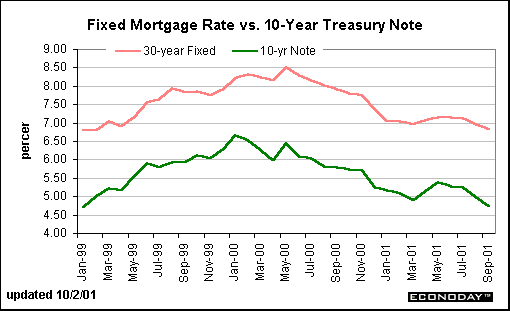
And what about equities?
Stock investors were expecting a rate cut of 50 basis points on Tuesday, and got their wish granted. Typically when market expectations are met, stock prices won't necessarily rally, but the Dow posted a healthy 113-point gain on Tuesday afternoon after the rate cut announcement. But underlying sentiment did not change in the equity market. Investors want to see an economic recovery that will generate some corporate profits. It is certainly possible that the market has already tested its lows for this cycle, but uncertainty is heightened these days. Most likely, September data (reported in October) will be affected by the terrorist attacks but won't be decisive in its meaning. But if October data (reported in November) show some signs of life, perhaps the stock market will also.
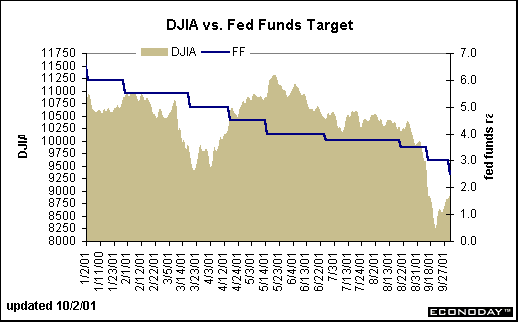
The bottom line
A majority of economists are declaring "economic recession." Media pundits are stressing mostly negative news - for instance dwelling on those consumers who are worried about spending even if they haven't lost their jobs. Our own anecdotal evidence considers that retail sales slowed in the week of the attack, but things started getting back to normal afterward. Even airlines have noted an increase in passenger loads the past couple of weeks. September car sales were down sharply from year ago levels but not all that different from August levels! There is no question that economic activity is sluggish and we may not see a sharp rebound in the near term. But we certainly hope that a recession is not a self-fulfilling prophecy spurred by not-so-helpful media mavens pointing only to the negative aspects of the economy.
Evelina M. Tainer, Chief Economist, Econoday
| 